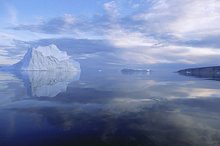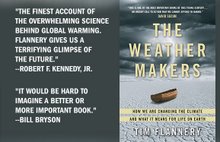Equally, due to the skewed priorities of now discredited neo-conservative ideology, the USA failed to make progress on its domestic front, especially in health and education: areas in which it does not compare favourably to other developed countries.
Responsibility for the catastrophic damage to the reputation of the USA can be laid at the feet of the “Bush 2” administration: so much damage done, so much opportunity lost.
Reprieve? We attribute the following statement to Ken Gude of the Guardian.
“All across the globe, people awoke Wednesday morning November 5, 2008 to a dramatically different world. Americans shook off the 400-year legacy of racism and elected an African-American named Barack Hussein Obama to the nation's highest office. That an experienced and admired war hero was defeated underscores the real significance of the electorate's hunger for change and the promise of an Obama presidency.
But the world that President-elect Obama awoke to on Wednesday morning had already changed. America's military deterrent, its economic power and its standing as a global leader have all nearly collapsed and old and new powers are seeking to fill the void.”
Note: The balance of Ken Gude’s article is paraphrased below as the third item in this issue.
We dedicate this issue of PacificSci Global Perspectives to Senator Obama’s political victory, and wish him whatever success is achievable in his efforts to turn around the abysmal situation described in our opening paragraph. He deserves wide support.
Reference: Ken Gude. The Guardian Newspaper on-line
President-Elect OBAMA – An Historic Breakthrough
The proposition that Barack Hussein Obama would become the 44th President of the United States seemed somehow remote. He was an unlikely candidate - he seemed inexperienced and had spent much of his childhood abroad. But mainly because he is black. It says much about the virtues of US democracy that Mr Obama could even have been nominated. But it says much more about perceptions of American democracy abroad that so many doubts prevailed for so long about the final outcome.
Opinion polls consistently gave Mr Obama an unassailable lead. The incumbent Republican President's personal ratings were at record lows. But the world would not believe until it saw it. Contrary to many predictions, race did not dominate the campaign. But it filled the gap between what Americans said they intended to do and what the rest of the world feared they would do. That anxiety played also on the minds of many US citizens. The joy expressed in the US and around the world at the result represents a moment of global realignment with America's best sense of national purpose. For most of its history, the US has perceived itself as a beacon of opportunity and an example to the world. Anti-Americanism, meanwhile, has always drawn strength from the assertion that those ideals are debased by the way the US projects its power abroad and by the raw facts of its unequal society.
A single election will not heal American social divisions, nor will it stop America pursuing its interests overseas, with military power if it so chooses. But by electing as their leader a man whose grandfather was a Kenyan goat-herder and who shares a middle name with the grandson of the Prophet Mohammed, Americans have made it harder for their enemies to portray them as a military nation and one of bigots.
Many challenges lie ahead but these should not detract from the optimism that is felt not only in America but around the world at the result of last week's election. Mr Obama has already proved his skill as a diplomat and politician. The young senator from Illinois once looked like an unconventional candidate. But a majority of US voters decided their choice would not be dictated by conventional thinking, choosing a President first and foremost to defend their own interests.
Source: Adapted from the Editorial: "America has restored the world's faith in its ideals". The Guardian Newspaper on-line
THE IN-TRAY – Key Issues for the Obama Presidency
In researching this issue, we looked at a number of sources, and settled on the Guardian’s coverage. Here we highlight that newspaper’s selection of key issues that must be tackled by President Obama and his team.
Health Care: Obama's plan (to include treating America's 46 million uninsured) entails using tax credits to coax more businesses into insuring their workers, while setting up a separate new healthcare system at a cost of more than $1 trillion. Can he do that while making good on a vow to reduce insurance fees by $2,500 per household?
Environment: for global climate talks to proceed smoothly next winter, Congress must be coaxed into approving US carbon emissions caps. Liberals will not hesitate to criticize him if he veers too far towards concessions to fossil-fuel producers. If Obama cannot bring Congress around, his advisers suggest he would use the president's regulatory powers to implement his plan for an 80% emissions reduction by 2050.
Energy: Americans pay $700 billion a year to oil-exporting nations. Obama wants to reduce that, and aims to put 1million plug-in hybrid cars into circulation by 2015, a formidable task while US car sales are tumbling. His goal to impose a windfall profits tax on oil companies is sure to draw intense opposition from the business lobby, while his promise to expand untested "clean coal" technology will anger the green movement.
Education: A quarter of US teenagers drop out before graduation, underscoring the need for an education overhaul when George Bush's No Child Left Behind policy expires next year. Obama has called for adding more funding to NCLB and shedding its emphasis on standardized tests. But with at least five states joining legal challenges to NCLB, he may be forced to focus on his less controversial goals, such as expanding early childhood education and community service tuition credits for university students.
Homeland security: Bush cut grants to police and firefighters by hundreds of millions of dollars, leaving a gaping hole in security for urban public transport as well as suburban street corners. Fixing that problem forces Obama to find extra cash during the economic crisis. But the real minefield is domestic surveillance, which alienated Obama from his Democratic base after he supported Bush's grab for new wiretapping powers.
Supreme Court: As many as three US supreme court justices are likely to retire in the next four years, giving Obama an opportunity to nominate justices that share his views on abortion, constitutional rights of terrorism suspects, separation of church and state, and other contentious social and legal issues. But legal analysts say the court's ideological make-up is unlikely to change much in Obama's first four-year term, because the justices likely to retire are firmly in the liberal wing.
Source: The In Tray: Key Issues. The Guardian Newspaper on-line
EDITORIAL NOTE: We note the curious omission of the economic collapse in this list, and refer readers to our last issue where this was addressed under title “the Brown Doctrine” http://pacificsci.blogspot.com/2008/10/global-economic-crisis-brown-doctrine.html
CLOSE GUANTANAMO, END TORTURE
According to the opinion expressed by Ken Gude of the Guardian, in contrast to the Bush administration's failed policies, Barack Obama will fight terrorism legally, competently. The following is paraphrased from his article referenced below, leaving in the active links to sources that he utilized in his original article.
President Bush will bequeath Obama numerous ongoing crises in Iraq, Afghanistan, Pakistan, Iran and Israel-Palestine that will demand urgent and sustained attention, constraining his ability to define his own agenda.
This makes it all the more important for President Obama to take US policy in a demonstrably different direction in the areas he can control, starting with the fight against al-Qaida. President Obama must follow through on his pledges to close Guantánamo Bay and renounce torture, and carry forward these changes by also shutting down the secret CIA prisons, ceasing extraordinary rendition and ensuring that all electronic surveillance is within the law and with necessary safeguards to protect against eavesdropping on innocent Americans. Obama will close Guantánamo Bay as one of his first actions as president. He will not be able to simply wave his hand and empty the prison, however, as any responsible policy will take time to implement.
Two early and relatively easy decisions will signal to the US and the world that Obama will chart a very different course than Bush: President Obama should order the release of Salim Hamdan and the remaining Guantánamo Uighurs. Hamdan was the first detainee convicted in a military commission trial, but the Bush administration will not release him even after his sentence expires at the end of the year. The 17 Guantánamo Uighurs are among the greatest tragedies of this sad saga, the Bush administration is fighting a US court decision ordering their release even though it has already determined that they are not enemy combatants.
Announcing the closure of Guantánamo Bay and releasing Hamdan and the Uighurs would change the dynamic surrounding the detention camp and enable the international cooperation required to ultimately empty the prison of the remaining 225 detainees. Obama should stop the military commissions process and begin preparing cases for trial in US courts against those detainees who should face criminal charges. He should institute at Guantánamo reintegration and de-radicalisation programmes that have been used successfully by the US military in Iraq and the Saudi government. And he should establish an international working group to find new homes for detainees that cannot be sent back to their home countries while accelerating transfers for those that can.
Thanks to President Bush, it is no longer adequate to assert that the US does not torture detainees in its custody and President Obama must go beyond simply returning to the pre-Bush status quo. The first step is to admit complicity in the torture of detainees in custody. President Obama should make public the legal opinions and policy guidelines that the Bush administration relied upon to craft its interrogation programmes. He should further pledge that all legal opinions developed by his administration related to interrogation and detention will be promptly and freely submitted to the relevant committees and leadership in Congress. Finally, President Obama should clearly and unequivocally publicly renounce torture and put all US government employees and contractors on notice that the torture and abuse of detainees will not be tolerated on his watch. President Obama should take the additional step of ensuring that the US is not complicit through the back door and end the outsourcing of torture by stopping extraordinary renditions and shutting down secret CIA prisons.
Many of Obama's supporters were disappointed in his decision this summer to support the compromise legislation on the National Security Agency's wiretapping programme. Some even worry that this move signals his intention to continue President Bush's warrantless wiretapping scheme, but that interpretation badly misreads both the political circumstances and the bill itself. A presidential campaign is a terrible place for tough policy decisions, and this latest amendment to the Foreign Intelligence Surveillance Act was far from perfect but importantly brought the entire surveillance programme under the jurisdiction of the FISA court. President Obama will now have pre-existing legislative sanction to conduct electronic surveillance with meaningful judicial oversight, which he clearly intends to do, and a strengthened progressive majority in both houses to pursue any additional steps necessary to preserve the liberties of the American people and prevent abuse.
Perhaps no area of US policy was more widely condemned than President Bush's war on terror and Obama must take immediate steps to reverse course or risk saddling all of America with the legacy of George W Bush. Under President Obama, America may come back, but there is no going back to the old order. Those countries who spent the Bush administration railing against American unilateralism must now accept the responsibilities that come with a seat at the table. The challenges we face are immense, and if we are to meet them we must work together in a spirit of cooperation that has not existed for many years, if it ever did. In the US and across the world, this is our time, this is our moment. Are we ready?
Source: Ken Gude. Close Guantanamo, end torture. The Guardian Newspaper on-line


























